九年级新目标英语过去完成时态的讲解及练习
- 格式:doc
- 大小:55.50 KB
- 文档页数:7
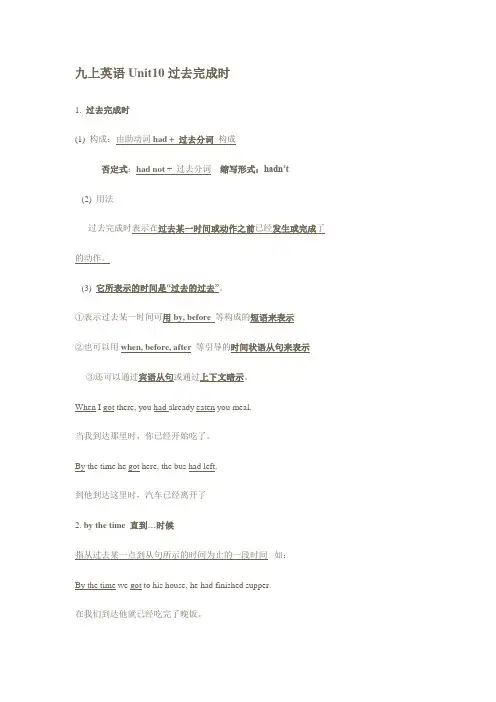
九上英语Unit10过去完成时1. 过去完成时(1) 构成:由助动词had + 过去分词构成否定式:had not + 过去分词缩写形式:hadn’t(2) 用法过去完成时表示在过去某一时间或动作之前已经发生或完成了的动作。
(3) 它所表示的时间是“过去的过去”。
①表示过去某一时间可用by, before 等构成的短语来表示②也可以用when, before, after等引导的时间状语从句来表示③还可以通过宾语从句或通过上下文暗示。
When I got there, you had already eaten you meal.当我到达那里时,你已经开始吃了。
By the time he got here, the bus had left.到他到达这里时,汽车已经离开了2. by the time 直到…时候指从过去某一点到从句所示的时间为止的一段时间如:By the time we got to his house, he had finished supper.在我们到达他就已经吃完了晚饭。
3. 英语中表示“把某物遗忘在某处”常用leave + 地点而不是forget+地点如:Unluckily, I left my book at home. 不幸的是,我把书忘在家里了。
4. close v. 关adv. 接近地靠近地closed adj. 关的5. come out 出来6. on time按时准时既不早也不迟in time及时指在时限到来之前7. luckily adv. 幸运地lucky adj. 幸运的luck n. 好运8. give sb. a ride 让某搭便车如:He often gives me a ride to school. 他经常让我搭便车去学校。
9.only just 刚刚好、恰好10. go off (闹钟)闹响The alarm went off just now. 刚才警钟响了。
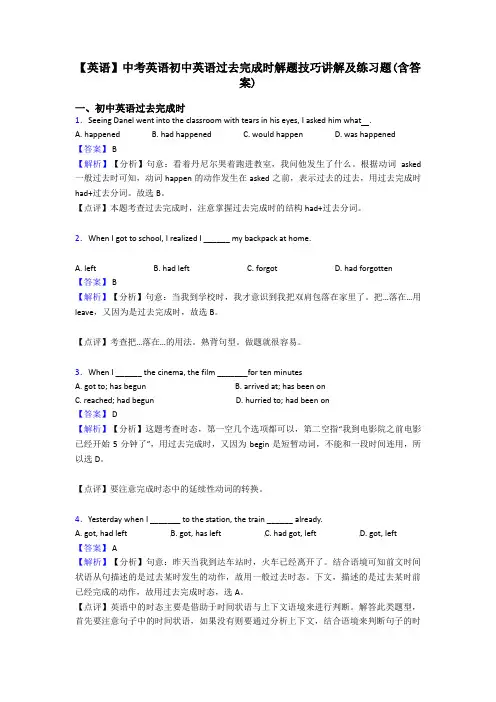
【英语】中考英语初中英语过去完成时解题技巧讲解及练习题(含答案)一、初中英语过去完成时1.Seeing Danel went into the classroom with tears in his eyes, I asked him what .A. happenedB. had happenedC. would happenD. was happened【答案】 B【解析】【分析】句意:看着丹尼尔哭着跑进教室,我问他发生了什么。
根据动词asked 一般过去时可知,动词happen的动作发生在asked之前,表示过去的过去,用过去完成时had+过去分词。
故选B。
【点评】本题考查过去完成时,注意掌握过去完成时的结构had+过去分词。
2.When I got to school, I realized I ______ my backpack at home.A. leftB. had leftC. forgotD. had forgotten【答案】 B【解析】【分析】句意:当我到学校时,我才意识到我把双肩包落在家里了。
把…落在…用leave,又因为是过去完成时,故选B。
【点评】考查把…落在…的用法。
熟背句型。
做题就很容易。
3.When I ______ the cinema, the film _______for ten minutesA. got to; has begunB. arrived at; has been onC. reached; had begunD. hurried to; had been on【答案】 D【解析】【分析】这题考查时态,第一空几个选项都可以,第二空指“我到电影院之前电影已经开始5分钟了”,用过去完成时,又因为begin是短暂动词,不能和一段时间连用,所以选D。
【点评】要注意完成时态中的延续性动词的转换。
4.Yesterday when I _______ to the station, the train ______ already.A. got, had leftB. got, has leftC. had got, leftD. got, left【答案】 A【解析】【分析】句意:昨天当我到达车站时,火车已经离开了。
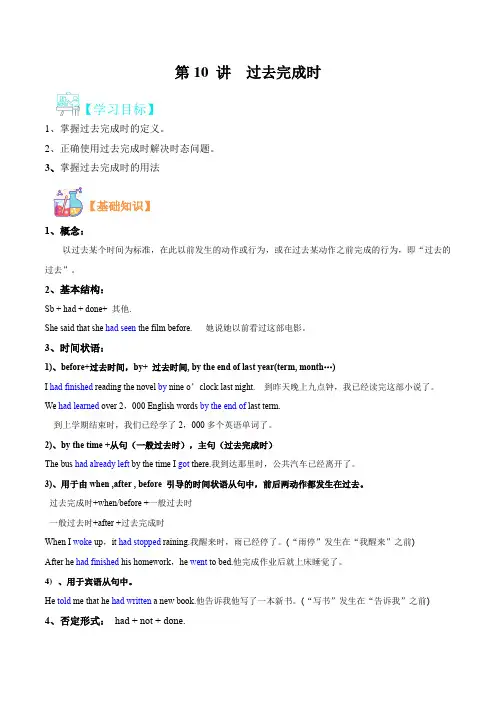
第10 讲过去完成时【学习目标】1、掌握过去完成时的定义。
2、正确使用过去完成时解决时态问题。
3、掌握过去完成时的用法【基础知识】1、概念:以过去某个时间为标准,在此以前发生的动作或行为,或在过去某动作之前完成的行为,即“过去的过去”。
2、基本结构:Sb + had + done+ 其他.She said that she had seen the film before. 她说她以前看过这部电影。
3、时间状语:1)、before+过去时间,by+ 过去时间, by the end of last year(term, month…)I had finished reading the novel by nine o’clock last night. 到昨天晚上九点钟,我已经读完这部小说了。
We had learned over 2,000 English words by the end of last term.到上学期结束时,我们已经学了2,000多个英语单词了。
2)、by the time +从句(一般过去时),主句(过去完成时)The bus had already left by the time I got there.我到达那里时,公共汽车已经离开了。
3)、用于由when ,after , before 引导的时间状语从句中,前后两动作都发生在过去。
过去完成时+when/before +一般过去时一般过去时+after +过去完成时When I woke up,it had stopped raining.我醒来时,雨已经停了。
(“雨停”发生在“我醒来”之前)After he had finished his homework,he went to bed.他完成作业后就上床睡觉了。
4)、用于宾语从句中。
He told me that he had written a new book.他告诉我他写了一本新书。
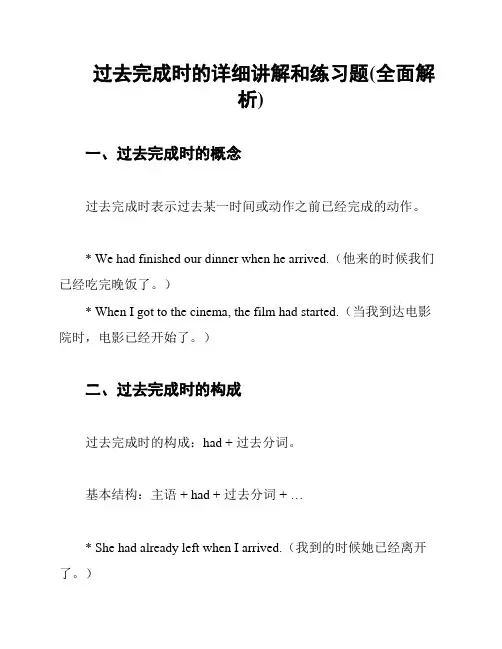
过去完成时的详细讲解和练习题(全面解析)一、过去完成时的概念过去完成时表示过去某一时间或动作之前已经完成的动作。
* We had finished our dinner when he arrived.(他来的时候我们已经吃完晚饭了。
)* When I got to the cinema, the film had started.(当我到达电影院时,电影已经开始了。
)二、过去完成时的构成过去完成时的构成:had + 过去分词。
基本结构:主语 + had + 过去分词+ …* She had already left when I arrived.(我到的时候她已经离开了。
)* I had finished my work before he called.(他打电话之前我已经完成了我的工作。
)三、过去完成时的用法1. 表示过去某个时间点之前已经完成的动作。
* They had gone out before I arrived.(我到之前他们就已经离开了。
)* She had read the book before she went to bed.(她在睡觉前已经读过那本书了。
)2. 表示过去的过去,即在过去某个时间或动作之前已经完成的动作。
常和过去时连用。
* He said that he had visited the museum before.(他说他以前去过博物馆。
)* She had finished her homework when her mother came back.(当她妈妈回来时,她已经完成了作业。
)四、过去完成时的练题1. __________(you, finish) your homework before you went to bed last night?2. By the time we arrived, the party __________(start) .3. I __________(not, see) the movie before last night.4. Before I came to China, I __________(study) Chinese for three years.5. They __________(already, leave) when I got to the station.【答案】1. Had you finished your homework before you went to bed last night?2. By the time we arrived, the party had started.3. I had not seen the movie before last night.4. Before I came to China, I had studied Chinese for three years.5. They had already left when I got to the station.。
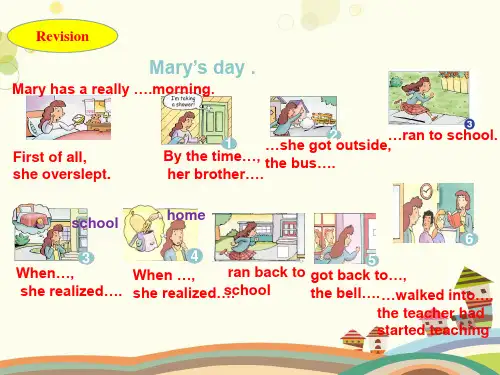
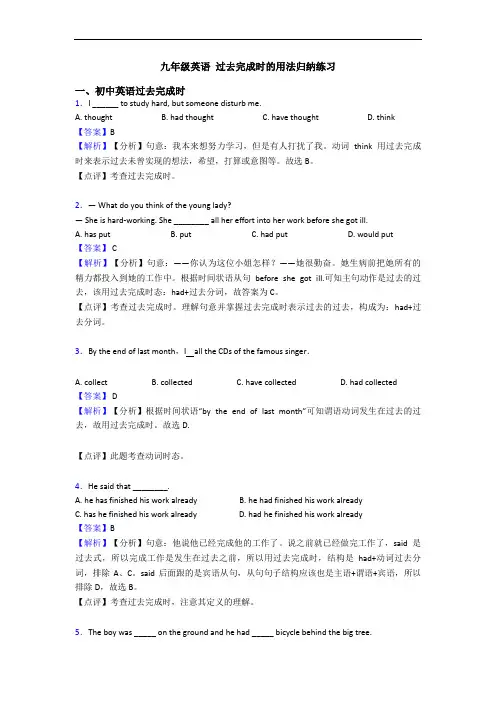
九年级英语过去完成时的用法归纳练习一、初中英语过去完成时1.I ______ to study hard, but someone disturb me.A. thoughtB. had thoughtC. have thoughtD. think【答案】B【解析】【分析】句意:我本来想努力学习,但是有人打扰了我。
动词think用过去完成时来表示过去未曾实现的想法,希望,打算或意图等。
故选B。
【点评】考查过去完成时。
2.— What do you think of the young lady?— She is hard-working. She ________ all her effort into her work before she got ill.A. has putB. putC. had putD. would put【答案】 C【解析】【分析】句意:——你认为这位小姐怎样?——她很勤奋。
她生病前把她所有的精力都投入到她的工作中。
根据时间状语从句before she got ill.可知主句动作是过去的过去,该用过去完成时态:had+过去分词,故答案为C。
【点评】考查过去完成时。
理解句意并掌握过去完成时表示过去的过去,构成为:had+过去分词。
3.By the end of last month,I all the CDs of the famous singer.A. collectB. collectedC. have collectedD. had collected【答案】 D【解析】【分析】根据时间状语“by the end of last month”可知谓语动词发生在过去的过去,故用过去完成时。
故选D.【点评】此题考查动词时态。
4.He said that ________.A. he has finished his work alreadyB. he had finished his work alreadyC. has he finished his work alreadyD. had he finished his work already【答案】B【解析】【分析】句意:他说他已经完成他的工作了。
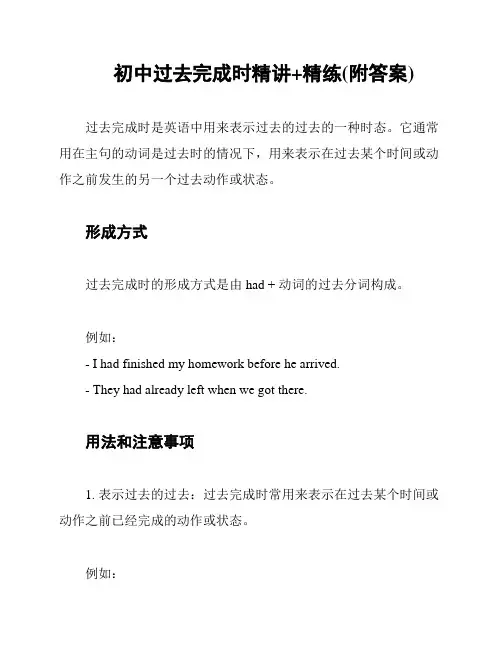
初中过去完成时精讲+精练(附答案)过去完成时是英语中用来表示过去的过去的一种时态。
它通常用在主句的动词是过去时的情况下,用来表示在过去某个时间或动作之前发生的另一个过去动作或状态。
形成方式过去完成时的形成方式是由 had + 动词的过去分词构成。
例如:- I had finished my homework before he arrived.- They had already left when we got there.用法和注意事项1. 表示过去的过去:过去完成时常用来表示在过去某个时间或动作之前已经完成的动作或状态。
例如:- She told me she had already eaten dinner.- He had studied English for five years before he moved to America.2. 引导时间状语从句:过去完成时也可以用来引导时间状语从句,表示在过去某个时间或动作之前已经完成的动作或状态。
例如:- They had finished their work before they went home.3. 与其他过去时态的区别:过去完成时和一般过去时以及过去进行时的区别在于它表示的是在过去的过去发生的动作或状态。
例如:- He said he had already bought the tickets. (过去完成时)- He said he bought the tickets. (一般过去时)精练请用过去完成时来完成下面的句子。
1. I ______ (finish) my homework before my parents came back.2. They ______ (leave) the office when I arrived.3. She ______ (already eat) dinner before we got there.4. We ______ (travel) to Europe many times before we visited Asia.5. He said he ______ (never see) that movie before.答案1. had finished2. had left3. had already eaten4. had traveled5. had never seen。
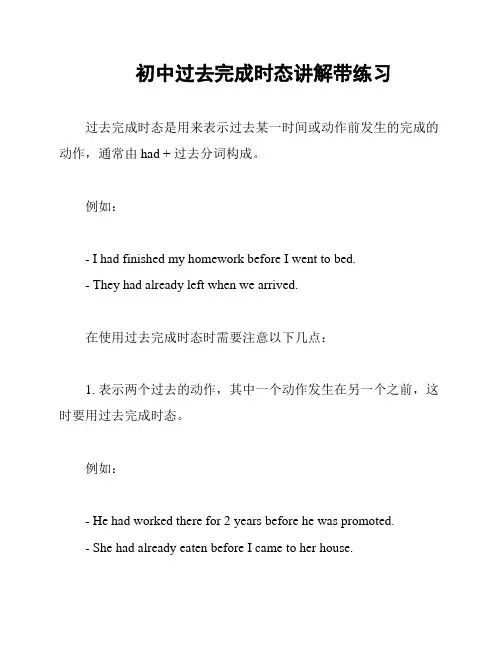
初中过去完成时态讲解带练习过去完成时态是用来表示过去某一时间或动作前发生的完成的动作,通常由had + 过去分词构成。
例如:- I had finished my homework before I went to bed.- They had already left when we arrived.在使用过去完成时态时需要注意以下几点:1. 表示两个过去的动作,其中一个动作发生在另一个之前,这时要用过去完成时态。
例如:- He had worked there for 2 years before he was promoted.- She had already eaten before I came to her house.2. 句子中需要明确表示一个动作发生在另一个动作之前,可以使用过去完成时态。
例如:- When I got home, my mother had already cooked dinner.- By the time we arrived at the cinema, the movie had already started.3. 注意过去完成时态的时间范围,它仅限于过去发生的动作,而不包括现在的动作。
例如:- I have been to Japan before. (不可用过去完成时态)以下是一些练,请用过去完成时态填空:1. By the time I ______ (arrive) at the party, everyone had left.2. She _______ (not finish) her work, so she had to stay late.3. When he __________ (arrive) at the station, the train had already left.4. They _________ (cook) dinner before their guests arrived.5. We _______ (already watch) that movie before.答案:1. arrived2. had not finished3. arrived4. had cooked5. had already watched。
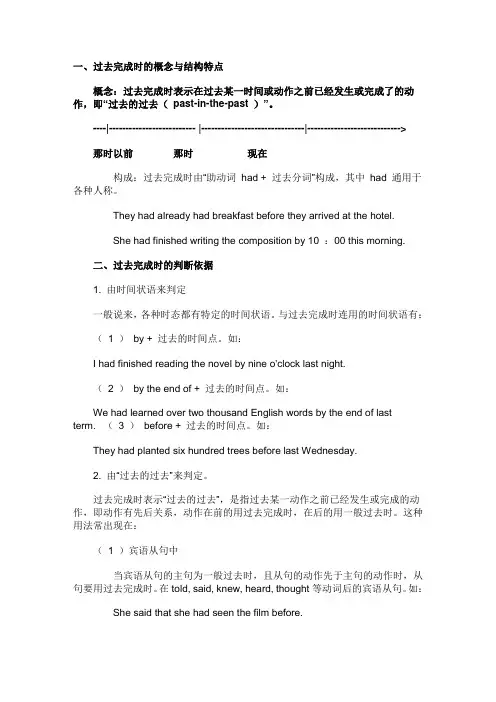
一、过去完成时的概念与结构特点概念:过去完成时表示在过去某一时间或动作之前已经发生或完成了的动作,即“过去的过去(past-in-the-past )”。
----|-------------------------- |-------------------------------|---------------------------->那时以前那时现在构成:过去完成时由“助动词had + 过去分词”构成,其中had 通用于各种人称。
They had already had breakfast before they arrived at the hotel.She had finished writing the composition by 10 :00 this morning.二、过去完成时的判断依据1. 由时间状语来判定一般说来,各种时态都有特定的时间状语。
与过去完成时连用的时间状语有:( 1 )by + 过去的时间点。
如:I had finished reading the novel by nine o'clock last night.( 2 )by the end of + 过去的时间点。
如:We had learned over two thousand English words by the end of last term. (3 )before + 过去的时间点。
如:They had planted six hundred trees before last Wednesday.2. 由“过去的过去”来判定。
过去完成时表示“过去的过去”,是指过去某一动作之前已经发生或完成的动作,即动作有先后关系,动作在前的用过去完成时,在后的用一般过去时。
这种用法常出现在:( 1 )宾语从句中当宾语从句的主句为一般过去时,且从句的动作先于主句的动作时,从句要用过去完成时。
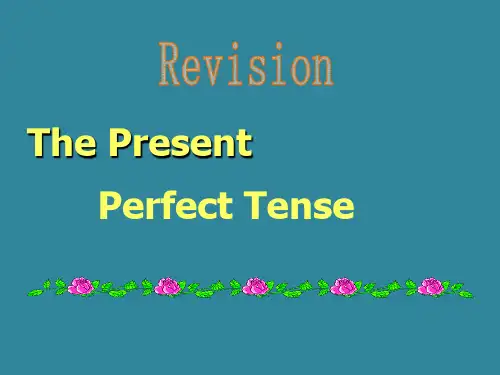
![[全]初三英语语法重点-过去完成时-详解](https://uimg.taocdn.com/3e7575e3a32d7375a517802f.webp)
初三英语语法重点-过去完成时-详解过去完成时一、教材典句1.By the time l got outside, the bus had already left.当我出去时,公共汽车已经离开了。
2.By the time I walked into class, the teacher had started teaching already.当我走进教室时,老师已经开始讲课了。
仔细观察以上两句,不难发现时间状语从句都用了一般过去时态,主句都是发生在“过去的时间之前”,即过去的过去,应用过去完成时。
二、语法详解(一)过去完成时的定义及构成1.过去完成时定义:表示在过去某个时间或动作之前已经发生或完成了的动作,它表示动作所发生的时间是“过去的过去”。
2.过去完成时的构成过去完成时由“助动词had+动词的过去分词”构成(had用于各种人称和数)。
例如:She had arrived at the village before 8 o'clock last night.她在昨晚8点之前就到达了这个村庄。
(二)过去完成时的句式结构肯定句:had +过去分词否定句:hadn’t+过去分词一般疑问句:had 提前,放于句首(三)过去完成时的时间状语1.介词by (the end of)/ before+ 过去的时间例如:They had collected over 1,000 stamps by the end of last month.截至上个月末,他们已搜集了1000多张邮票。
2.与when, by the time, before, after 等引导的时间状语从句连用。
例如:When I got up this morning,my father had already gone to work. 今天早上我起床时,我的爸爸已经去上班了。
3.用于told, said, asked,heard,thought等动词的宾语从句中,从句的动作发生在主句动作之前。
初中过去完成时讲解与练习过去完成时(past perfect)表示在过去某一时间或动作之前已经发生或完成了的动作或状态。
它表示句子中描述的动作发生在“过去的过去”。
基本结构主语+had+过去分词Vpp.(done)①肯定句:主语+had+过去分词.②否定句:主语+had+not+过去分词.③一般疑问句:Had+主语+过去分词?肯定回答:Yes,主语+had.否定回答:No,主语+had not .④特殊疑问句:特殊疑问词或词组+一般疑问句(Had+主语+过去分词)?基本用法(1)表示在过去某一时刻或动作以前完成了的动作,也可以说过去的时间关于过去的动作。
即“过去的过去”。
可以用by, before等介词短语或一个时间状语从句来表示,也可以用一个表示过去的动作来表示,还可能通过上下文来表示。
例如:By nine o’clock last night, we had got 200 picture s from the spaceship. 到昨晚9点钟,我们已经收到200 张飞船发来的图片。
(2)表示由过去的某一时刻开始,一直延续到过去另一时间的动作或状态,常和for, since构成的时间状语连用。
例如:I had been at the bus stop for 20 minutes when a bus finally came.当车来的时候,我在车站已等了20分钟。
He said he had worked in that factory since 1949.他说自从1949年以来他就在那家工厂工作。
(3)叙述过去发生的事情,在已叙述了过去发生的事情后,反过来追述或补述以前发生的动作时,常使用过去完成时。
例如:Mr. Smith died yesterday. He had been a good friend of mine.史密斯先生昨天去世了。
他以前是我的好友。
I didn’t know a thing about the verbs, for I had not studied my lesson.我对动词一无所知,因为我没有好好学习功课。
九年级过去完成时用法讲解1、概述过去完成时表示过去某一时间或动作以前已经发生或完成了的动作。
它表示动作发生的时间是“过去的过去”。
表示过去某一时间可用by, before等构成的短语,也可用when, before等引导的从句或通过上下代表示。
His eyes shone brightly when he finally received the magazine he had long expected. 当她终于收到她盼望已久的杂志时,她兴奋得两眼闪光。
By the time he was twelve, Edison had begun to make a living by himself.12岁时,爱迪生就开始自己谋生。
2、构成过去完成时由“助动词had+过去分词”构成。
其否定式、肯定式、疑问式如下表:肯定式 had +PP 否定式 had+not PP 疑问式Had...PP?注意:had not 常简略为hadn't。
They asked me to have a drink with them and said it was at least ten years since I had enjoyed a good drink. 他们请我和他们一起喝酒,并说我自上次喝酒到现在至少十年了。
We had learnt 30 lessons by the end of last month.到上个月末为止,我们已经学了30课。
He said we hadn’t seen each other since I left Beijing.自从我离开北京,我们还没见过面。
3、过去完成时的用法过去完成时的主要用法和现在完成时一样。
不同的是,过去完成时把时间推移到了过去某一时间之前,与现在无关。
(1)过去完成时表示在过去某一时间或动作以前已经完成了的动作。
这个过去的时间状语有by, before等介词短语或when, before等引导的从句。
中考英语过去完成时详解以及练习一.过去完成时详解1)概念与结构概念:过去完成时描述的是一个动作或状态在过去某一时间点之前已经完成或达到的状态。
换句话说,它表示的是“过去的过去”的动作或状态。
结构:“助动词had + 过去分词”,其中“had”是过去完成时的助动词,适用于所有人称。
2)基本用法表示过去某一时间之前已完成的动作:例句:By the end of last year, he had worked in that company for five years.(到去年年底为止,他已经在那个公司工作了五年。
)解析:此句中,“到去年年底为止”是过去的一个时间点,而“工作了五年”是在这个时间点之前完成的动作,因此使用过去完成时。
表示过去某一动作之前已完成的另一动作:例句:She had finished her homework before her mother came back.(她妈妈回来之前,她已经完成了作业。
)解析:此句中,“妈妈回来”是一个过去的动作,而“完成作业”是在这个动作之前完成的,所以“完成作业”用过去完成时。
3)与时间状语连用过去完成时经常与表示过去的时间状语连用,如“before”、“by”等。
与“before”连用:例句:He had left the house before it started raining.(下雨之前,他已经离开了家。
)解析:“下雨”是一个过去的动作,而“离开家”是在这个动作之前完成的,所以“离开家”用过去完成时。
与“by”连用:例句:By the time he was twenty, he had traveled to more than ten countries.(到他二十岁的时候,他已经去过了十多个国家。
)解析:“到他二十岁的时候”是一个过去的时间点,而“去过了十多个国家”是在这个时间点之前完成的,因此使用过去完成时。
4)在复合句中的使用过去完成时经常出现在复合句中,尤其是宾语从句和状语从句中。
九年级英语新目标过去完成时复习课件Unit 10By the time I got outside, the bus had already left.Period OneGrammar Focus The Past Perfect Tense 过去完成时Grammar Focus (P77)2. 过去完成时可以表示过去某一时刻或某一动作之前完成的动作或呈现的状态。
也就是说发生在“过去的过去”1. 过去完成时构成:had+过去分词By the time I got to school, the bell had rung. =when 当…的时候I got to school.now8:007:30amThe bell rang.当我到学校时,上课铃已经响了My mom came back.now9:00am8:00amI cleaned up the yard.By the time my mom came back, I had cleaned up the yard.8:00am9:00amnowBy the time she went outside, the bus had left.She went outside.The bus left.the policeman get to the shop.Tom run away.By the time the policeman got to the shop, Tom had run away.now5:00pm6:00pmBy the time Liu Mei woke up, the concert had been over.now8:00pm8:15pmThe concert was over.。
过去完成时一、过去完成时的构成助动词had+过去分词二、过去完成时的用法1. 表示在过去某一时间或动作之前已经发生或完成了的动作或状态,即这一动作或状态发生的时间是“过去的过去”。
如:I forgot to tell you that I had read this novel before.2. 表示一个动作或状态在过去某时之前已经开始,一直延续到这一过去时间,而且到那时还未结束,仍有继续下去的可能性。
如:Luke had been in China for seven years by the end of last year.三、一些使用过去完成时的常见情况1. 由by(在某时前,到某时)构成的短语表示过去的时间时,句子常用过去完成时。
如:By ten o'clock yesterday evening, she had finished her homework.2. 由by the time (在……以前)和when / before引导的时间状语从句使用了一般过去时,而主句的动作发生在从句动作之前,此时主句用过去完成时。
如:By the time I got home, my father had left for New York.Ann had been at the bus stop for 20 minutes when a bus finally came.Tim had rushed out of the door before I could stop him.3. 在含有宾语从句的复合句中,主句使用了一般过去时,而从句的动作发生在主句动作之前,此时从句用过去完成时。
如:The Smiths were glad to know that their son had won the competition.【链接】现在完成时与过去完成时的区别现在完成时表示的动作发生在说话之前某个没有明确说出的过去时间,侧重过去发生的动作对现在产生的影响或造成的结果,与现在有关;过去完成时的动作发生在“过去的过去”,它是一个相对的时态,不能离开过去的时间而独立存在。
九年级过去完成时用法讲解1、概述过去完成时表示过去某一时间或动作以前已经发生或完成了的动作。
它表示动作发生的时间是“过去的过去”。
表示过去某一时间可用by, before 等构成的短语,也可用when, before等引导的从句或通过上下代表示。
His eyes shone brightly when he finally received the magazine he had long expected. 当她终于收到她盼望已久的杂志时,她兴奋得两眼闪光。
By the time he was twelve, Edison had begun to make a living by himself.12岁时,爱迪生就开始自己谋生。
2、构成过去完成时由“助动词had+过去分词”构成。
其否定式、肯定式、疑问式如下表:肯定式 had +PP 否定式 had+not PP疑问式Had...PP?注意:had not 常简略为hadn't。
They asked me to have a drink with them and said it was at least ten years since I had enjoyed a good drink. 他们请我和他们一起喝酒,并说我自上次喝酒到现在至少十年了。
We had learnt 30 lessons by the end of last month.到上个月末为止,我们已经学了30课。
He said we hadn’t seen each other since I left Beijing.自从我离开北京,我们还没见过面。
3、过去完成时的用法过去完成时的主要用法和现在完成时一样。
不同的是,过去完成时把时间推移到了过去某一时间之前,与现在无关。
(1)过去完成时表示在过去某一时间或动作以前已经完成了的动作。
这个过去的时间状语有by, before等介词短语或when, before等引导的从句。
Helen had left her keys in the office so she had to wait until her husband came home. 海伦把钥匙忘到办公室里了,因此她不得不等她丈夫回来。
When we got to the cinema, the film had already begun.当我们到达电影院时,电影已经开始了。
He told me that he had visited the Great Wall before.他告诉我他以前参观过长城。
By the end of the match, they had kicked 2 goals, and we had kicked 4.比赛结束时,他们踢进了2个球而我们踢进了4个球。
When Jack arrived he learned Mary had been away for almost an hour.杰克到达后得知玛丽走了近一个小时了。
(2)表示动作在过去某一时间之前开始,一直延续到过去的这一时间,而且还可能继续下去的动作,常和for, since构成的短语或引导的从句连用。
The news came as no surprise to me. I had known for some time that the factory was going to shut down. 听到这个消息我并不感到吃惊。
工厂要倒闭这件事我早就知道了。
By the time I left the school, he had taught the class for 3 years.到我毕业时,他已经教那个班三年了。
He said he had made great progress since he came here.他说自从他来这里他已经取得了很大进步。
(3)用于表示与过去事实相反的虚拟条件从句或as if从句中表示与过去事实相反If he had seen you yesterday, he would have asked you about it.假如他昨天看到你,他就会问你这件事了。
I should have called you if I had known your telephone number.假如我过去知道你的电话号码,我就给你打电话了。
He described the scene as if he had been there.他描绘的景色如同他去过那里一样。
Had I known that you wanted the book, I would have sent it.如果我知道你要这本书,我会送来的。
(4)表示假设的宾语从句放在像said,told,asked,thought,wondered等过去时动词的后面,表示在这些动作发生之前已经发生了的事情。
My friend told me that he had passed the exam.我的朋友告诉我,他已通过了考试。
He asked me whether I had seen the film the night before.他问我头一天晚上是否看过那部电影。
She wondered who had left the door open.她想知道谁敞着门的。
(5)用在 "It was t he first/second/third…time that…”句型中在此句型中,主句用了一般过去时,that引导的定语从句要用过去完成时。
This was the first time they had met in thirty-nine years. 这是39年里他们第一次见面。
It was the first time we had spoken together. 这是我们第一次在一起说话。
(6)intend, mean, hope, want, plan, suppose, expect, think等动词的过去完成时可以表示一个本来打算做而没有做的事这种结构也可以表示过去未曾实现的设想、意图或希望等,含有某种惋惜。
I had intended to call on you yesterday, but I had an unexpected visitor.我本来昨天打算要去看你,但我来了个不速之客。
We had meant to tell her the news but found that she wasn’t in.我们本想把这个消息告诉她的,但发现她不在家。
(7)过去完成时常用结构有“hardly, scarcely, barely … when, no sooner… than等副词的句子里。
She hardly had gone to bed when the bell rang.他刚睡下铃就响了。
No sooner had they left the building than a bomb exploded.他们刚刚离开大楼,一颗炸弹就爆炸了。
(8)当before , after, as soon as 等引导的从句里的动作与主句的动作紧接时,由于这些连词本身已经说明了两个动作发生的先后关系,因此两个动作均可用一般过去时表示。
We had breakfast after we did morning exercises.做完早操之后,我们吃早饭。
The train started to move just before we reached the station.我们到车站时火车刚开动。
As soon as they got there, they started to study.他们一到那里就开始学习了。
过去完成时练习1. 单项选择1.He asked me __A___ during the summer holidays.A. where I had beenB. where I had goneC. where had I beenD. where had I gone2. What _D___ Jane ____ by the time he was sever?A. did, doB. has, done C did, did. D. had, done3. I ___C___ 900 English words by the time I was ten。
A. learnedB. was learningC. had learnedD. learnt4. She ___A___lived here for ______ years.A. had, a fewB. has, severalC. had, a lot ofD. has, a great deal of5. By the time my parents reached home yesterday, I __A___ the dinner already.A had cooked B. cooked C. have cooked D. was cooked6. She said she __D________ the principle alreadyA .has seen B. saw C. will see D. had seen7. She said her family __B_____ themselves ______ the army during the war.A. has hidden, fromB. had hidden, fromC. has hidden, withD. had hidden, with8. By the time he was ten years old, he ___D______.A. has completed universityB. has completed the universityB. had completed an university D. had completed university9. She had written a number of books ___C___ the end of last year.A. forB. inC. byD. at 10. He __B___ to play ____ before he was 11 years old.A had learned, piano B. had learned, the pianoC. has learned, the pianoD. learns ,piano.11. What __D_____ Annie ____ by the time he was ten?A. did, doB. did, didC. has, doneD. had done12 .He _C__ in the factory for three years before he joined the Army.A. has workedB. worksC. had workedD. will work13. By the end of last week, they _D___ the bridge.A. has completedB. completedC. will completeD. had completed14. Ben hates playing _D____ violin, but he likes playing ____ football.A. a…theB. the… theC. / …theD. the…/15. By the time he was 4, he _A_____ a lot of German words.A. had learnedB. has learnedC. learnedD. learns16 .Jim turned off the lights and then __D___ the classroom.A. was leftB. had leftC. has leftD. left17.They ____C_____ in Guangzhou since 2000.A. livedB. had livedC. have livedD. were living18. The train from Beijing__C_____ ten minutes ago.A. has arrivedB. was arrivingC. arrivedD. had arrived19. The students ___B______ their classroom when the visitors arrived.A . have cleaned B. had cleaned C. was cleaned D. have been cleaned20. Fergie__B_____ the project in one hour.A. have finishedB. will finishC. finishesD. has finished21. The man ___A_____ his coat and went out.A. put onB. had put onC. will put onD. was putting on22 My mother_____ in that factory at the age of 18.A. had workedB. has workedC. workedD. works23. Dad _C_______ while he _______ TV.A .fell asleep…watch B. was falling asleep…watchedC. fell asleep……was watchingD. had fallen asleep…watched2.用动词的适当形式填空1. We ___had painted____ (paint) the house before we moved________ (move) in.2. That rich old man __had made___ (make) a will before he died(die).3. They __had studyed_ (study) the map of the country before they_left___ (leave).4. The robbers _had run away____ (run away ) before the policemen arrived (arrive).5. I __turned off_____ (turn off) all the lights before I __went___ (go) to bed.6. Paul went (go) out with Jane after he _made _____ (make) a phone call.7. Tom ___said__ (say) he had read_______ (read) the book twice.8. Our plan ____failed_ (fail ) because we _had made______ (make) a bad mistake.9. When the chairman ___finished_____ (finish) speaking, he____left____ (leave)the hall.10.The Reads were having (have) lunch when I ___got_____(get) to their house.11.When I __arrived________(arrive) at the station, he ___hadleft_____(leave).12..We _____had learned___(learn) about 4000 English words by the end of last term.13. I waited until he __finished_____(finish) his homework.14. We were surprised at what she _had____already __done____(do)15.She _didn't go___(not go) to Qingdao because she ___had went____ (go) there before.16. He __hasn't told (not tell) you the news yet.17. He said he __had______already___given___(give) the book to the teacher.18. I ____have been_____(be) to Shanghai before.19. She told me she ___hadbeen_______(be) to Sanya three times.20.She __was playing________(play) the guitar while her sister__was singing______(sing).3.句型转换1.I had sold the ticket when she came.(改否定句)I did not have sold the ticket when she came.2.She had sung a song to us before she danced.(改否定句)She didn't have sung a song to us before she danced.3.They began to climbed the mountain after they had bought all the food and drink.(否)They did not begin to climbed the mountain after they had bought all the food and drink. 4.By 10:00 a.m, I had been very hungry. (改一般疑问)Had you been very hungry by 10:00 am?5.Lucy had already completed the project when I arrived.(改一般疑问)Had lucy already completed the project when I arrived.6.By the time he got to the airport, the plane had taken off. (改一般疑问)Had th eplane taken off by the time he got to the airport?7..He had broken his arm when I saw him.(对划线部分提问)How was he when you saw him?8.When he had read the note, he ate it. (对划线部分提问)What did he do when he had the note?9..Jack didn’t go to the cinema because he had seen the film. (对划线部分提问)Why did Jack not go to the cinema?10.We had had the toys for ten years before we gave them to the child. (对划线部分提问)How long did you have had the toys before you gave them to the child?11.She had written the book by the end of 1960. (对划线部分提问)What had she written by the end of 1960?12.We cooked the dumplings. We ate them up. (用过去完成时连接两句)We ate the dumplings after we had cooked them.13.Jim’s father mended the car. It was broken. (用过去完成时连接两句)The car had broken before Jim's father manded it.14.We had our tests. Then we had a long holiday.( 用过去完成时连接两句)After we ___had had hour teats________, we ___had a longholiday___________15.He showed us a picture. Then he showed us around the house. 用过去完成时连接两句)Before he ___had showed us around the house_______, he_______showed us a picture___________1.When she was at the middle school,she often reads in the library.2.When she got home,the children went to bed.3.He said he didn't see his uncle for many years.4.I didn't go to see the firm because I saw it before.5.The wind was still blowing,but the rain has stopped.6.By the end of last term we learned about 1,500 English words.7.Lu Xun had spocken to the youth about the study of the foreign language.8.Yang Mei learn some English before she came to this school.参考答案:read 一般过去时had gone to bed 过去完成时,先于got home发生hadn't seen 主句为过去时的间接引语,从句倒退一个时态,故从现在完成时变成过去完成时had seen 过去完成时,先于didn't go to see 发生had 过去完成时,先于was still blowing发生had learnt By+过去的时间,用过去完成时has spoken 过去发生的事情对现在不造成影响had learnt 过去的过去,用过去完成时,先于came to this school。